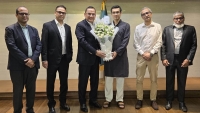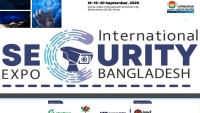
বুধবার ● ১২ জুন ২০২৪
প্রথম পাতা » English » IPv6 Adoption crucial for Bangladesh’s Internet Economy: Paul Wilson
IPv6 Adoption crucial for Bangladesh’s Internet Economy: Paul Wilson
Mohammad Kawsar Uddin
 Mr. Paul Wilson, the Director General of the Asia Pacific Network Information Centre (APNIC), recently shared his views on the Internet Infrastructure and Operational Community of Bangladesh in an exclusive interview. He discussed the rapid growth of Bangladesh’s Internet industry, the country’s active participation in regional and global Internet governance, and the upcoming APRICOT 2025 & APNIC 59 conference, which is set to be held in Bangladesh in February 2025. Mr. Wilson also provided valuable insights on various issues related to the Internet community in Bangladesh, including the importance of IPv6 adoption, the need for diverse participation in technical conferences, and the role of APNIC in supporting the country’s Internet ecosystem. The following is a brief account of his interview, shedding light on Bangladesh’s thriving Internet landscape and its future potential.
Mr. Paul Wilson, the Director General of the Asia Pacific Network Information Centre (APNIC), recently shared his views on the Internet Infrastructure and Operational Community of Bangladesh in an exclusive interview. He discussed the rapid growth of Bangladesh’s Internet industry, the country’s active participation in regional and global Internet governance, and the upcoming APRICOT 2025 & APNIC 59 conference, which is set to be held in Bangladesh in February 2025. Mr. Wilson also provided valuable insights on various issues related to the Internet community in Bangladesh, including the importance of IPv6 adoption, the need for diverse participation in technical conferences, and the role of APNIC in supporting the country’s Internet ecosystem. The following is a brief account of his interview, shedding light on Bangladesh’s thriving Internet landscape and its future potential.
Question: What is your observation about the overall Internet infrastructure in Bangladesh?
Paul Wilson: In terms of membership, Bangladesh has been one of the fastest growing APNIC economies for several years now. There is high ongoing growth of the industry in terms of APNIC membership, but also consolidation indicated by the rate of membership mergers; these are natural signs of the maturing of the Internet industry in Bangladesh.
Bangladesh has over 1900 ASNs allocated, and a very respectable level of interconnection among them: substantially more than Viet Nam for instance, but less than Indonesia. This is a great sign for Internet maturity and reliability, and for the future of the national Internet.
In terms of IP addressing, BD only has around 2 million IPv4 addresses allocated from APNIC, in some 2270 separate delegations: but over 50 million IPv6 addresses (/48) in 1600 delegations.IPv6 capability is still less than 20% but this is growing rapidly with 3 major providers having deployed IPv6- Grameenphone leading with 52% capability. There is more work to do, and I can only encourage stakeholders in Bangladesh to move now in preparing for IPv6 and deploying as soon as possible.
To do so will improve network speed and efficiency and decrease costs of network address translation and IP address purchase – both of which can be avoided by those who deploy IPv6. The competitive advantage of IPv6 is very real today; both for the individual Internet service provider, and for the country as an Internet economy.
Anyone wishing to know more about IPv6 can find extensive information through the APNIC website, APNIC Academy and IPv6 events, and from other Internet sources of course.
Question: How do you view the Internet Operational Community of Bangladesh?
Paul Wilson: The operational community in Bangladesh is large and dynamic, with many independent network operators and a very encouraging level of participation in national community activities such as ISPAB and BDNOG; and in regional activities such as SANOG, APRICOT and APNIC conferences. I have been particularly pleased and grateful for the level of participation in APNIC events, in recent years. The strength and engagement of the DB community is also shown by the presence of a member from Bangladesh on the APNIC governing board of directors (the APNIC EC). Sumon Sabir is well known to the APNIC community, and we are very grateful for his contributions to the EC.
Question: APRICOT 2025 & APNIC 59 will be held in Bangladesh next year, what is your expectation from this? How will Bangladeshi policymakers and the internet community benefit from the conference?
Paul Wilson: At APNIC we are looking forward very much to finally being back in Bangladesh for an APNIC conference, in 2025. Of course we have visited Bangladesh very often in recent years, in support of BDNOG, SANOG and APNIC training events; but a major conference will help very much in supporting the local Internet community, and in creating international linkages.
At APNIC and APRICOT events there are many important opportunities for many different stakeholders in the Internet community. We hope to see not only Internet operators and service providers, but also Government, business and civil society, educators, researchers and students. This will assist in professional development, in networking, and in raising awareness of Internet issues that are critical to Bangladesh. Knowing the Bangladesh community as I do, I am sure it will be one of the largest and most exciting APNIC conferences ever.
Question: What is the future direction of IGF globally? How can the Internet communities in Bangladesh including the government be more involved and active in IGF?
Paul Wilson: As a UN event, IGF is in the hands of the United Nations; but as a unique multistakeholder institution it is also in the hands of all Internet stakeholders. As IGF approaches 20 years, and the question of its renewal, it remains the only venue in which Internet governance can be discussed by all stakeholders, at national regional and global levels. Therefore, many feel it is critical for it to continue, but also to continue to evolve.
Bangladesh has a strong Internet Governance community, in fact one of the strongest and most diverse in the world; and I do encourage this to continue. Those who are already engaged can do more, both inside and outside Bangladesh to encourage IGF participation and evolution; and those not yet involved can do so through our numerous national events.I do encourage the latter, particularly from a wider community of Internet users who are now highly dependent on the Internet, and who stand to benefit the most by continuation of the current model of Internet Governance.
Question: What is your opinion about the participation of non-technical persons (policymakers, journalists, civil society) in technical programs like APNIC/ICANN conferences? How can we increase their participation?
Paul Wilson: APNIC events are open to all participants, and as a non-profit organization we try to minimize costs of participation as much as we can. We seek sponsorships from local and regional partners to help reduce costs, and we offer remote participation, via the Internet, at no charge at all. Also, we offer part- or fully funded fellowships to those who need assistance to travel or attend; and we support fellows to help them get the most from events.
Question: How can APNIC ensure more Journalists’ involvement during the different APNIC conferences?
Paul Wilson: We certainly encourage journalists to attend, and to seek stories and interviews with APNIC representatives and conference participants. Media wishing to provide special coverage of APNIC events can be in touch to enquire about registration arrangements.
Question: APNIC has a fellowship program to encourage people to join and contribute to the APNIC conference. But there is no category for Media/Journalist to apply for the fellowship, what is your opinion regarding this, and how can journalists participate in the different technical conferences like APNIC and APRICOT conferences?
Paul Wilson: There is not a special category for journalists, but journalists are welcome and encouraged to apply through the usual fellowship programme.





 Shaila Sharmin re-elected as APNIC Policy SIG co-chair
Shaila Sharmin re-elected as APNIC Policy SIG co-chair  Bangladesh-China Apon Media Club and TMGB Sign MoU to Enhance Tech News Exchange
Bangladesh-China Apon Media Club and TMGB Sign MoU to Enhance Tech News Exchange  The Protocol Revolution: How Bangladesh can be a part of this journey
The Protocol Revolution: How Bangladesh can be a part of this journey  From Everest to Maldives: The Story of Community Networks in Remote Areas
From Everest to Maldives: The Story of Community Networks in Remote Areas  Russia to host World Digital Forum 2025
Russia to host World Digital Forum 2025  ICANN’s Multi-Stakeholder Approach and Bangladesh’s Role
ICANN’s Multi-Stakeholder Approach and Bangladesh’s Role  The Invisible Backbone: Why Bangladesh is falling behind in the Internet Revolution
The Invisible Backbone: Why Bangladesh is falling behind in the Internet Revolution  Applications for the 2025 APNIC Fellowship program are now open
Applications for the 2025 APNIC Fellowship program are now open  We work together with Bangladesh Community to move IPv6 adoption forward: Jia Rong
We work together with Bangladesh Community to move IPv6 adoption forward: Jia Rong  Signing Ceremony of MoU Between BIGF & ISOC Bangladesh
Signing Ceremony of MoU Between BIGF & ISOC Bangladesh 







